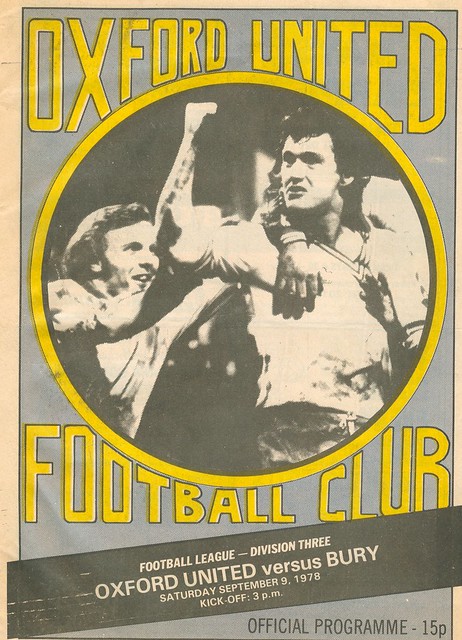The result, of course, was another win, our 9th goal of the season, our six different goalscorer and, most notably, a first from James Constable. Constable's goal was a wonder, but it was greeted in the same way that local neighbours do on DIY SOS when seeing a renovated house for a family beset with illness and other misfortune. The reaction didn't suggest that this wasn't really Constable doing what he does; the goal, like the renovation, was 'so deserved' given what he's been through.
It's never been a barrier to those who phone Radio Oxford, but I'm not qualified to make meaningful comment on professional football, I haven't played organised football since I was at school. I can't qualify my views by saying things like 'I've played the game at a high level of the North Witney Veterans Monday Night 5-a-side league'.
I don't know if there's the concept of first and second teams anymore. At school, excluding goths, there were about 20 boys willing to play football. The first team consisted of capable sporting boys; there wasn't a long tail from which a second team could be created; in the vernacular of Saved By The Bell the second team were dweebs and nerds. I remember one asking to play striker because that's what was written on the Gola boots his mum had bought.
It's difficult to know whether there's a first and second team at Oxford. We have a development squad; which may be the reserves, or the youth team, or neither of these. Perhaps managers don't think of first teams; Chris Wilder is known to relegate players from a winning line-up right out of the following match day squad. Sometimes there seems no relationship between selection and performance. Perhaps players are selected to tactical requirements.
Against Bury Chris Wilder reinstated four players he'd left out against Charlton; one might reasonably assume that they had been rested. One of the four who made way was James Constable.
Constable is or was the quintessential star striker for Oxford; he captained the team, scored the goals, took the penalties and generally set an example to the players around him. Through Twitter, he also proved himself a nice balanced guy and, through his rejection of Swindon's overtures, loyal too. If modern Oxford United could be described as one person, it would be James Constable. And we needed him, the club spent more than a decade enduring players we felt no more than a duty to support, but who frustrated and underwhelmed.
What role does Constable play in Wilder 2.0? Or is it Lenagan 1.0? It might be my imagination, but Wilder seems to have been taken out of the firing line and the club is moving towards being less reliant on one man. The new era, is emerging is a new spine on the pitch; Clarke, Mullins, Wright, Whing, Kitson and Smalley. But not Constable.
Spiritually, everything that Constable was, he still is, but he's not a goal machine. Despite his strike against Torquay, you can't rely on him to grab a goal in a tight game. You'd rely on him to work hard from box to box, he's a exemplary representative of the club. But can the club sustain a well paid ambassador who spends much of his time on the bench? And does Constable want to play that role?
He's entering an interesting period in his career; at 28 he won't necessarily be able to rely on his natural physical attributes - pace and strength will slowly begin to desert him - he may need to think about new ways of sustaining himself physically. In addition; in a few weeks will be a father for the first time. If he needs to remodel his game; in the way Alan Shearer did when his injuries began to take their toll, he'll be doing it during the emotional and physical chaos of a new baby.
Economics aside, I've no doubt that Chris Wilder would keep Constable. He still represents many of the core values of the squad and provides a link to where we've been (and never want to go back) and where we are, and between the senior squad and the development squad - many of whom will have watched and admired Constable as children, presumably. But it's hard to imagine him returning to that player who would not only score lots of goals, but at the right time too. Wilder has managed to unpick himself from that Constable dilemma where he would almost obliged to pick Constable, because if he didn't and we lost, it's because our 'star striker' is on the bench. That's not really Constable's role anymore.
So, is Constable a back-up striker? One of a group of strikers who will be used according to form throughout the season? Some kind of spiritual force within the squad? Or a spare wheel and relic from our recent past. While his history assures him legend status in the future, his current position remains uncertain.



